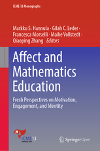- About MAA
- Membership
- MAA Publications
- Periodicals
- Blogs
- MAA Book Series
- MAA Press (an imprint of the AMS)
- MAA Notes
- MAA Reviews
- Mathematical Communication
- Information for Libraries
- Author Resources
- Advertise with MAA
- Meetings
- Competitions
- Programs
- Communities
- MAA Sections
- SIGMAA
- MAA Connect
- Students
- MAA Awards
- Awards Booklets
- Writing Awards
- Teaching Awards
- Service Awards
- Research Awards
- Lecture Awards
- Putnam Competition Individual and Team Winners
- D. E. Shaw Group AMC 8 Awards & Certificates
- Maryam Mirzakhani AMC 10 A Awards & Certificates
- Two Sigma AMC 10 B Awards & Certificates
- Jane Street AMC 12 A Awards & Certificates
- Akamai AMC 12 B Awards & Certificates
- High School Teachers
- News
You are here
Affect and Mathematics Education

Publisher:
Springer
Publication Date:
2019
Number of Pages:
437
Format:
Hardcover
Series:
ICME-13 Monographs
Price:
59.99
ISBN:
978-3-030-13760-1
Category:
Proceedings
[Reviewed by , on ]
Peter Olszewski
11/9/2019
Affect and Mathematics Education: Fresh Perspectives on Motivation, Engagement, and Identity is an ICME-13 monograph providing the reader with the most up-to-date research work in the area. The monograph is divided into three main parts: 1. Interest, Motivation, and Values, 2. Engagement and Flow, and 3. Identity. The monograph also has an Introduction and Conclusion. As pointed out in the Introduction on page 4, the topic of Affect was a result of Topic Study Group 28 [TSG28]:
TSG28 was aimed at addressing all areas of affect, including attitude, anxiety, beliefs, meaning, self-concept, emotion, interest, motivation, needs, goals, identity, norms, and values. The different approaches to study affect included psychological, social, and philosophical research perspectives. Moreover, the call for papers explicitly questioned the issue of the mutual relationship between affective constructs and their connection to cognition and other constructs studied in mathematics education, as well as the description of programs for promoting aspects of affect.
The activity of the working group was aimed at:
- Presenting an overview of the state of the art in the research field of affect in mathematics education, both at the students’ and the teachers’ (pre-service or in-service) level.
- To identify new trends and developments in research and practice in these areas.
- To engage participants in a critical reflection of this research field and generate discussion of an agenda for future research on affect in mathematics education.
The book has many international contributors, which give a great diversity of perspectives to the topic of affect for a wide range of grade levels.
In Chapter 2: Mathematics-Related Beliefs and Affect by Gilah C. Leder asks the reader to consider why beliefs and affect are in the same title of the research work. Quoting Mason (2004) on page 16 and outlining what all letters of the alphabet mean in terms of affect, the research describes how math educators define beliefs and which elements are widely accepted. One of the most interesting results in terms of adult math education on page 20 indicates that negative attitudes towards mathematics, which can be very difficult to change in adults, can interfere with teacher learning while much is still unknown about the relationship between teachers’ attitudes and practice.
In Chapter 3: Multiple Solutions, The Experience of Competence, and Interest by Kay Achmetli and Stanislaw Schukajlow, the two main research questions asked are:
- Does constructing multiple solutions while solving real-world problems affect students’ experience of competence and their interest in mathematics?
- How does constructing multiple solutions work together with the experience of competence and prior interest to improve students’ interest at post-test?
In Chapter 5, the High School Longitudinal Study of 2009 is a long-term study of 21,000 United States 9th grade students in 944 schools with the purpose of looking at students’ experiences in high school with focus on mathematics and science regarding attitudes, motivation, and achievement. Chapter 11 on Intertwinement of Rationality and Emotions in Mathematics Teaching focuses on a teacher, Carla, and the relation between her actions in a 9th grade classroom along with examining her speech and emotional elements towards the students. On pages 240-249, several pictures are given of Carla with various body movements and postures to pass down to her students her passion for teaching. The combination of rational and emotional sides of the body movements, follow-up questions, and overall care, allow Carla to have a positive affect on student learning.
This monograph is a great resource for those math educators who wish to have a background in the interaction of affect and mathematics education. We, as educators, know that the attitudes of students towards mathematics play a big role in how students study, learn, view, and use mathematics in the future. As this research continues to grow in the math education arena, the more we know to get these students motivated to see how important mathematics is in real-life applications, the more we can bring out the emotional side of the love of learning mathematics and learning in general. We need this research to continue not only for the future of our students but also for us as teachers to pass the affect, emotion, motivation, and love of mathematics to future generations.
Peter Olszewski is a Mathematics Lecturer at The Pennsylvania State University, The Behrend College, an editor for Larson Texts, Inc. in Erie, PA, and is the 362nd Chapter Advisor of the Pennsylvania Alpha Beta Chapter of Pi Mu Epsilon. His Research fields are in mathematics education, Cayley Color Graphs, Markov Chains, and mathematical textbooks. He can be reached at pto2@psu.edu.
See the publisher's web page.
- Log in to post comments




